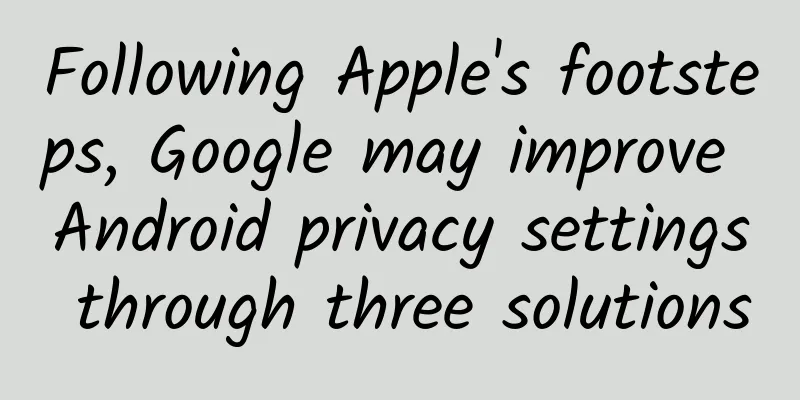Following Apple's footsteps, Google may improve Android privacy settings through three solutions

|
On May 26, it was reported that Apple introduced a privacy change a few weeks ago that app developers, advertisers, and Facebook have always worried about, that is, developers need to first obtain user consent before they can track users' advertiser identifiers (IDFA) on third-party websites and applications. The impact of Apple's move on developers and advertisers has not yet appeared, and they are waiting for the "second shoe" to land, that is, Google's adjustment to Android AdID.
Many people had expected Google to announce similar adjustments to Android AdID at last week's developer conference, but this did not happen. However, this does not mean that Google has chosen to give up and adjustments are inevitable. But the good news is that developers are not just sitting and waiting, they can evaluate the potential measures that Google may implement to develop strategies that will help mitigate the impact of Google's final decision. Here are three scenarios in which Google might choose to adjust Android AdID, along with the likelihood of each being implemented and the possible impact it would have: Solution 1: Completely abandon Android AdIDThe most complex transition would be to deprecate Android AdID entirely and move ad serving and reporting to the Android operating system. Such an approach would build on the work of the Chrome Privacy Sandbox team and may mirror some of the features of Apple's SKAdNetwork. At a high level, solutions like Privacy Sandbox and SKAdNetwork break the relationship between developers/publishers and consumers. While there is a lively debate about whether this approach is good for consumer privacy, less controversial is that it will entrench platform power at the expense of independent ad tech, advertisers, and potentially publishers and app developers. However, with Google already facing an investigation into the competition and privacy impacts of Privacy Sandbox, can the company really afford to have Android scrutinized by competition regulators? Conclusion: It's unlikely that Google will choose this option, but it's still a possibility if the company decides to align Chrome and Android. Option 2: Follow Apple’s lead and launch an anti-tracking feature in APPThe second option is to follow the approach taken by Apple in the APP anti-tracking feature (i.e. Ad Tracking Transparency, ATT for short), that is, to obtain the user's Android AdID and track user behavior, it is necessary to obtain the user's permission first. At the same time, Google needs to launch a relevant policy framework to regulate and enforce a broader definition of tracking. Remember that tracking on iOS involves a lot of data usage, not just access to IDFA. While such a scenario is not impossible, it would alienate Google from two key stakeholder groups, app developers and advertisers. App developers would find it harder to understand whether their ads drove app installs, and advertisers would find it harder to deliver personalized ads within apps. Unlike Google, recent congressional testimony seems to indicate that Apple has no vested interest in the advertising ecosystem. If Google eventually makes major policy changes around tracking, expect a collaborative rollout to give developers and advertisers time to fully prepare for such a significant change. Conclusion: This solution is feasible, but Google will have to bear the risk of a backlash from stakeholders. Option 3: Give users a choice and comply with the lawThe third option that Google may implement is to launch a simplified alternative to Apple's ATT, where users can choose whether to accept access to Android AdID, but they do not need to obtain user consent in advance for additional tracking like Apple does. Moving Android AdID to the options is a technical change, while requiring user consent for other forms of tracking, such as collecting email addresses when logging in, is a policy shift. This approach will provide consumers with additional transparency and choice while avoiding thorny policy debates around how to define tracking. In addition to Android AdID, app developers can also collect and use other data in accordance with laws such as California's Consumer Privacy Act, Virginia's Consumer Data Protection Act, and the EU's General Data Protection Regulation. This approach will leave the debate about "what constitutes tracking factors" to the U.S. Congress, which will deal with the pros and cons and related policy debates. This is the most likely scenario for three reasons: first, it would clearly be a step in the right direction for consumers; second, it would help assuage the concerns of privacy regulators; and third, it would maintain the trust of app developers and advertisers. Conclusion: This seems to be the most likely option for Google.Google is expected to make an announcement in the coming months, and app developers and advertisers must use this time to bet on which of the three options above is most likely to be implemented, and then step up planning and preparation to respond. It’s also important to remember that no matter which approach Google chooses, consumer privacy will be paramount. This will likely mean a future of smaller data sizes, smarter data science, and clearer explanations of the value exchange that occurs when consumers choose to allow their data to be collected and used. Trust must be at the core of everything we build. |
<<: WeChat's new gameplay is so magical! Be the first to experience WeChat Android beta version
Recommend
Companionship growth training camp
Companion Growth Training Camp Resource Introduct...
Can an individual make money by operating a WeChat mini program?
Q: Can I make money by operating a WeChat mini pr...
Cooperative SEO training: Why can’t I rank high after doing so much?
When we do website optimization, we must combine ...
An introduction to 360 Fengwu industry direct advertising promotion product styles!
In order to better promote for you, Fengwu Advanc...
What are Tencent Video Ads? Introduction to the process of placing Tencent Video information stream ads!
What are Tencent Video Ads? Tencent Video is the ...
Ni Jianwei's secret to explosive sales and winning orders: there is no customer or order that cannot be handled
The author of "Sales is about getting people...
Watch brand ranking and price: Four important features of website SEO optimization model recommendation
The first feature is the popularity feature, whic...
A guide to placing game ads on Toutiao today!
On Toutiao , there are 50 million people who play...
To improve the conversion rate of promotion landing pages, there are five essential elements...
The landing page is the first impression that con...
Make money by doing tasks on B station short videos. The whole process is simple and easy to operate on mobile phone
The B station that everyone usually refers to is ...
Facing the "uncertainty" of products and operations, my two working methods and judgment logic
When developing products or doing operations , yo...
Review of the method of making a poster that can increase the number of fans per day, and a practical growth strategy
Before talking about the logic of fission posters...
Reference for advertising data in various channels in the tourism industry!
Industry: Tourism industry Business products: Tou...
How to create a knowledge and skill-based Douyin account?
Andy Warhol once said something that has been pro...
11 cases to teach you how to operate a community!
Community is an area that almost all Internet pro...









